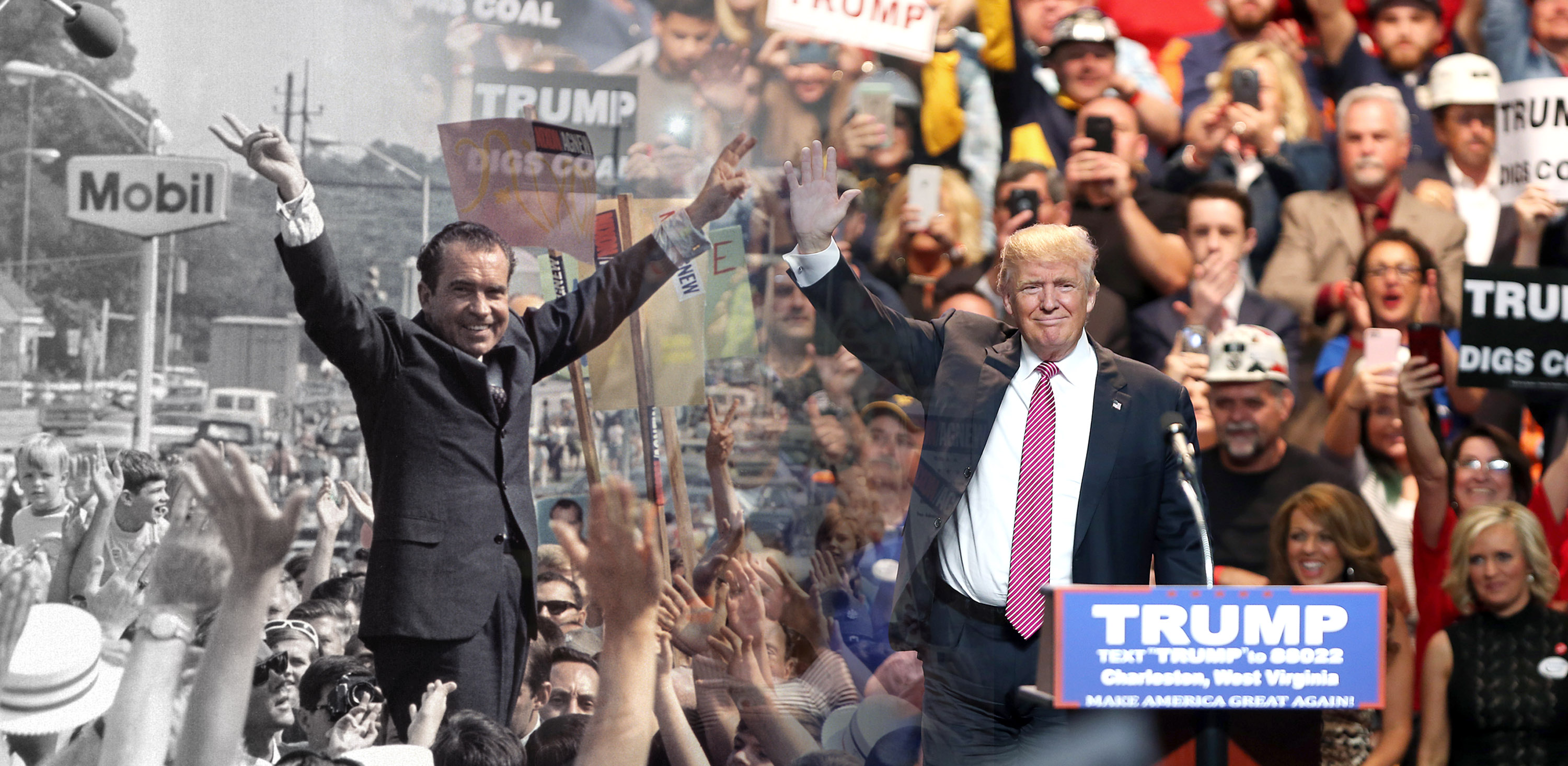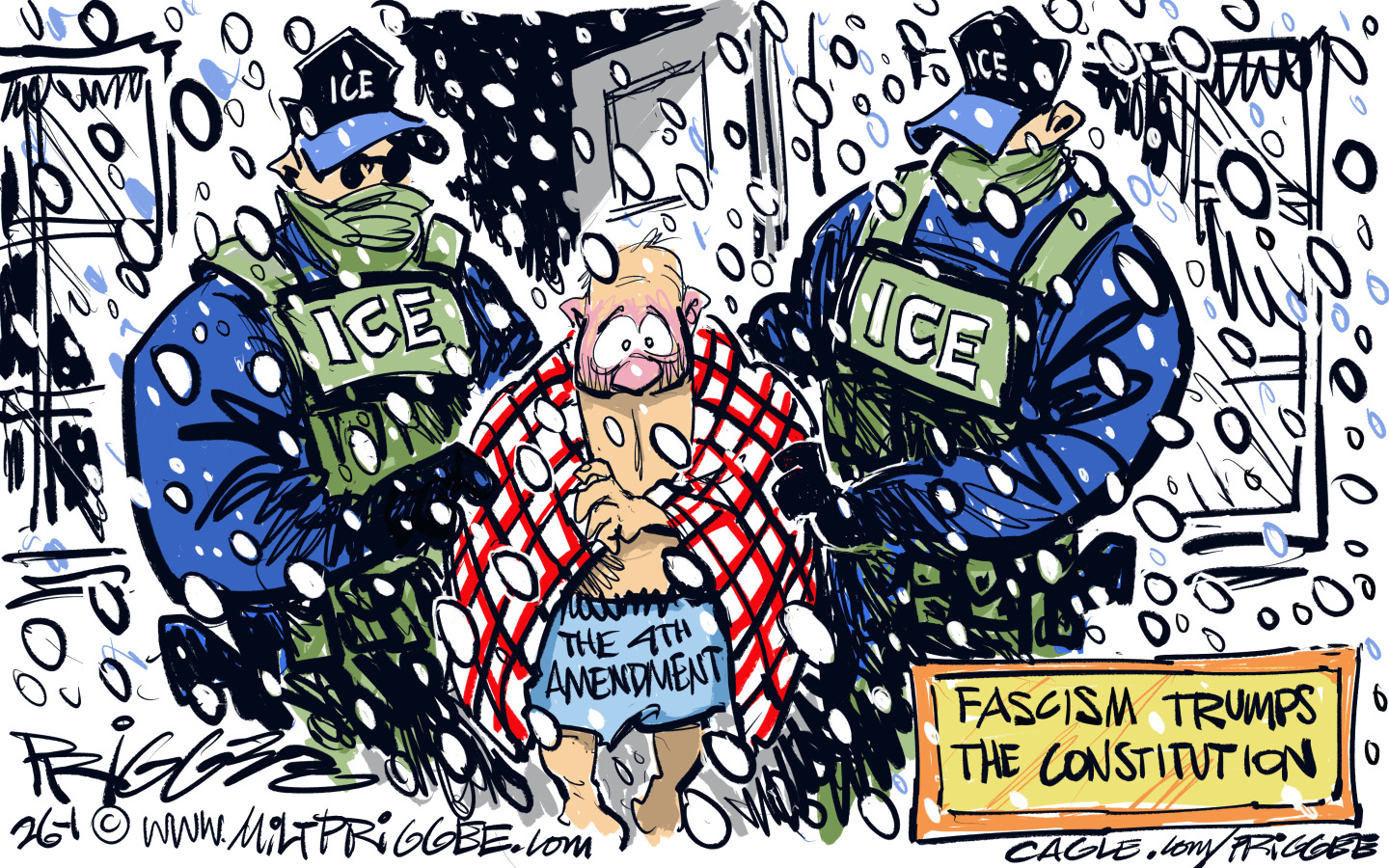Donald Trump's rise and the echoes of 1968
Trump bears a passing similarity to George Wallace, the flamboyantly populist and demagogic former Alabama governor who ran for president in 1968


The 2016 presidential election featuring Donald Trump vs. Hillary Clinton might end up being as nasty as Thomas Jefferson's and John Adams' fierce face-off in 1800. (Team Jefferson accused Adams of having a "hideous hermaphroditical character," and the Adams camp ripped Jefferson as "the son of a half-breed Indian squaw, sired by a Virginia mulatto father." And so on.)
The 2016 election also might be as realigning as the election of 1828, when the Democratic-Republicans split over the power of banks and the federal government. The 2016 election may well change the way elections themselves operate, like in 1896, when William McKinley discovered the power of both regional media and big business fundraising.
But historians listening to Donald Trump prepare to take on Hillary Clinton also hear an echo from 1968. After John F. Kennedy was assassinated in 1963, making Lyndon B. Johnson president, Americans picked Johnson again in 1964 as the man best suited to carry out Kennedy's policies. But then, in 1968, they quickly reversed course.
The Week
Escape your echo chamber. Get the facts behind the news, plus analysis from multiple perspectives.

Sign up for The Week's Free Newsletters
From our morning news briefing to a weekly Good News Newsletter, get the best of The Week delivered directly to your inbox.
From our morning news briefing to a weekly Good News Newsletter, get the best of The Week delivered directly to your inbox.
The 1968 election cycle featured two turbulent primaries, political assassinations, the breakup of a major party, and the breaking out of barely suppressed but incredibly powerful white working-class rage. It ended with the election of Richard Nixon, and with two parties bearing new identities: The Democrats were the party of civil rights; the Republicans were the party of law and order. Voters began to cluster accordingly.
Why did the country change its mind so quickly?
The same question is on my mind now. How could the same country that turned to Barack Obama so enthusiastically in 2008 and 2012 be ready to shelve everything associated with that man and elect his total opposite?
The tectonic plates of politics are always moving, and in a polarized country, we are, in fact, always shifting back and forth between poles. The election might depend on what mood a small group of swing voters in swing states are in on the morning of the first Tuesday in November.
A free daily email with the biggest news stories of the day – and the best features from TheWeek.com
Or perhaps it's just that Obama is the anomaly. He co-opted the technology and language of anxious millennials. Or maybe the Republicans simply wasted two otherwise ripe cycles nominating good, smart men — John McCain and Mitt Romney — who, for the most part, played to people's ambitions, and not to their fears.
Donald Trump, by contrast, is one giant bundle of resentment, to borrow Rick Perlstein's description of Nixon. But Trump, of course, is no Nixon. Politically and intellectually, Nixon was much smarter and far more cautious. There is no easy way to link the men other than to notice how they managed to capture a certain frustrated, anxious mood, colored by but not entirely explained by racial and ethnic resentment, exploit it by division, and ride it all the way to victory
In language and temperament, Trump bears a passing similarity to George Wallace, the flamboyantly populist and demagogic former Alabama governor who ran for president in 1968 and saw the world in black and white and had to make a pledge to his donors not to use the "n" word in public. Wallace ran as an American Independent to try to get the House of Representatives to decide the election. He believed that the establishment of the Republican Party had been taken over by racial integrationists bent on compromise. He was not opposed to big government so much as he was a keen advocate of redirecting the flow of its money.
Like Trump, Nixon was not a real conservative. As author Michael Cohen notes, "Nixon continued the process of social provision begun under Roosevelt [but] he cloaked it in the language of populist anti-government and anti-elitist rhetoric."
In his new book American Maelstrom: The 1968 Election and the Politics of Division, Cohen ticks off the ways this mood manifested itself in the 1968 electorate:
- Anti-government conservative rhetoric became more popular, particularly as it related to government transfer programs aimed at the poor and minorities.
- Liberals grabbed the levers of power inside their party, taking it way from big-city mayors and union bosses, and broke the Democratic Party into factions that persist to this day.
- The "silent majority" began to assert itself on issues of crime, drugs, and cultural liberalism.
- The middle class focused intently on keeping what they had gotten. Since 1965, they had gained quite a bit, as the economy grew. But they perceived the opposite, and so they tried to build a moat to keep their castles intact.
Does that sound like 2016? In many ways, yes. But there are profound differences, too.
For one thing, in 1968 both parties still had control over their nomination process. There was no way Wallace could ever have won the Republican nomination, as Trump is on the verge of doing.
In 1968, the American middle class was still on the tail end of some very good years. Today, the white working class has not benefited from the slow but steady economic growth that has characterized the Obama era. Certain groups have. But many policies, like the health insurance reform Obama began — and the next president (even Trump) will likely finish — may take years of trial and error before people begin to feel more security from them. And neither the Republican nor the Democratic Party has a plausible platform for economic prosperity. The Democrats seem to use a lot of trendy buzzwords and hope that Americans begin to assess their condition more accurately. The Republicans are still focused on supply-side tax cuts.
In 1968, the media was monolithic. It carried influence, it arbitrated between right and wrong, and it conferred legitimacy. Today, the media is anarchic, afraid of its own shadow, and it carries, and repeats to us, the stuff that makes us mad without giving us a real way to do anything about it, aside from expressing that anger at someone else online. Creative hashtags won't heal American divisions.
Finally, Johnson had Vietnam. Barack Obama has his silent wars, but none of this is remotely as divisive as the conflict in Indochina, which, in fact, came to bedevil Nixon as much as it did Johnson, even as Nixon was well-suited to exploit the carnage for domestic political advantage. As Cohen notes, Johnson pursued a middle ground on Vietnam, and lost his party, and then lost the middle of the country. His bridge to white voters, already rickety because of his extraordinary assertiveness on civil rights, crumpled because he escalated the war. Americans did not want to "middle through." They wanted to win — or they wanted to get out.
Johnson could never figure out how to make Americans feel good about being Americans. His policies at home were divisive, and he did not have the right options available to him — or so he felt — to intervene decisively in a way that kept Americans focus on what united them.
And today, Trump says he wants to make America great again. Echoes of 1968, after all.
Marc Ambinder is TheWeek.com's editor-at-large. He is the author, with D.B. Grady, of The Command and Deep State: Inside the Government Secrecy Industry. Marc is also a contributing editor for The Atlantic and GQ. Formerly, he served as White House correspondent for National Journal, chief political consultant for CBS News, and politics editor at The Atlantic. Marc is a 2001 graduate of Harvard. He is married to Michael Park, a corporate strategy consultant, and lives in Los Angeles.
-
 31 political cartoons for January 2026
31 political cartoons for January 2026Cartoons Editorial cartoonists take on Donald Trump, ICE, the World Economic Forum in Davos, Greenland and more
-
 Political cartoons for January 31
Political cartoons for January 31Cartoons Saturday's political cartoons include congressional spin, Obamacare subsidies, and more
-
 Syria’s Kurds: abandoned by their US ally
Syria’s Kurds: abandoned by their US allyTalking Point Ahmed al-Sharaa’s lightning offensive against Syrian Kurdistan belies his promise to respect the country’s ethnic minorities
-
 The billionaires’ wealth tax: a catastrophe for California?
The billionaires’ wealth tax: a catastrophe for California?Talking Point Peter Thiel and Larry Page preparing to change state residency
-
 Bari Weiss’ ‘60 Minutes’ scandal is about more than one report
Bari Weiss’ ‘60 Minutes’ scandal is about more than one reportIN THE SPOTLIGHT By blocking an approved segment on a controversial prison holding US deportees in El Salvador, the editor-in-chief of CBS News has become the main story
-
 Has Zohran Mamdani shown the Democrats how to win again?
Has Zohran Mamdani shown the Democrats how to win again?Today’s Big Question New York City mayoral election touted as victory for left-wing populists but moderate centrist wins elsewhere present more complex path for Democratic Party
-
 Millions turn out for anti-Trump ‘No Kings’ rallies
Millions turn out for anti-Trump ‘No Kings’ ralliesSpeed Read An estimated 7 million people participated, 2 million more than at the first ‘No Kings’ protest in June
-
 Ghislaine Maxwell: angling for a Trump pardon
Ghislaine Maxwell: angling for a Trump pardonTalking Point Convicted sex trafficker's testimony could shed new light on president's links to Jeffrey Epstein
-
 The last words and final moments of 40 presidents
The last words and final moments of 40 presidentsThe Explainer Some are eloquent quotes worthy of the holders of the highest office in the nation, and others... aren't
-
 The JFK files: the truth at last?
The JFK files: the truth at last?In The Spotlight More than 64,000 previously classified documents relating the 1963 assassination of John F. Kennedy have been released by the Trump administration
-
 'Seriously, not literally': how should the world take Donald Trump?
'Seriously, not literally': how should the world take Donald Trump?Today's big question White House rhetoric and reality look likely to become increasingly blurred
